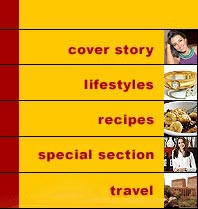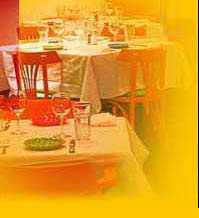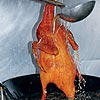So, what are the various methods involved in cooking the duck?
Well, though there are numerous ways of cooking duck, I would like to highlight a few methods which give one enough room to play with its taste, yet retain its intrinsic flavours and original texture.
 Roasting is a wonderful method of cooking, be it 'whole roasting' of the game bird or it's prime cut, the breast. Roasting renders the fat, which is present just under the skin, and keeps the underlying meat moist all the time. The uniform layer of fat under the skin acts like a shield when the duck is subjected to high temperatures while cooking.
Roasting is a wonderful method of cooking, be it 'whole roasting' of the game bird or it's prime cut, the breast. Roasting renders the fat, which is present just under the skin, and keeps the underlying meat moist all the time. The uniform layer of fat under the skin acts like a shield when the duck is subjected to high temperatures while cooking.
Roasting a Whole Duck
While roasting a whole duck, it is advisable to rinse the raw duck with boiling salted water. This closes the pores of the skin and makes it taut, which thereafter turns crisp on roasting.
The skin is pricked in order to help render the fat during the process of cooking as duck is relished best without the flavours of fat on the palate. During the process of roasting, the meat absorbs the flavour of the fat, which melts out of the pores, making the skin crisp yet keeping the underlying meat moist.
The average roasting time for a whole duck weighing 1200gms, is approximately 60 to 70 minutes in a preheated oven at 180 - 200 degree Celsius. Basting the duck every 10 to 15 minutes, results in a crisp skin with the right dark brown texture. In certain cuisine where the crisp skin is treated as a delicacy, prior to roasting, air is pumped in between the layer of the fat and the meat to break the connecting tissues.
Roasting of Duck Breast
 The sides of the breast are trimmed of all loose fat and skin. Contrary to pricking the skin with a needle, as in whole roast duck, here the layer of fat and skin is serrated with a knife in a crisscross manner.
The sides of the breast are trimmed of all loose fat and skin. Contrary to pricking the skin with a needle, as in whole roast duck, here the layer of fat and skin is serrated with a knife in a crisscross manner.
This method does not involve the use of any cooking medium. The fat rendered from beneath the skin does the trick. The breast is seasoned and pan seared, with the skin side down for 5 minutes and then turned over for just a minute in order to sear the pores. It is then roasted, skin side down, for another 8 to 10 minutes in an oven at 160 to 180 degree Celsius on a wire rack. It's imperative to rest the meat for 10 minutes in a warm temperature for the meat to relax and the rendered juices to be absorbed back.
Braised Duck
 This method is used to cook large birds which tend to get tough on cooking. The bird is trussed, seasoned and seared on all sides by pouring hot oil and then placed on a roasting tray with root vegetables at the base.
This method is used to cook large birds which tend to get tough on cooking. The bird is trussed, seasoned and seared on all sides by pouring hot oil and then placed on a roasting tray with root vegetables at the base.
Chicken or duck stock is poured in the tray and it is then covered with foil paper and cooked in the oven for nearly an hour. It is important to turn sides every 20 minutes with the last ones without the cover, to colour the skin evenly.
Confit Duck
This one is mostly used for cooking duck legs wherein the skin and fat on duck legs are marinated overnight in sea salt, then rinsed and slow cooked while immersed in melted duck fat. This method, wherein the meat is slowly cooked in its own fat, produces excellent results and helps preserve the meat for weeks together in a refrigerator. Please do ensure the meat stays fully immersed in its own fat with no direct contact with air.
 Ya Rou Zheng Bao
Ya Rou Zheng Bao
Steamed, barbequed duck buns.
Serves: 4
Ingredients:
Dough
Refined wheat flour - 250 gms
Baking powder - 2 gms
Dry active yeast - 5 gms
Castor sugar - 30 gms, Salt - 5 gms
Water - 180 ml, Refined oil - 5 ml
Filling
Barbequed duck breast, diced (1/2 cm.) - 1 nos.
Deshelled, deveined, slit into 2 & blanched shrimps - 150 gms (Optional)
Soaked & diced (1/2 cm.) shitake
mushrooms - 100 gms
Oyster sauce - 15 gms
Light soy sauce - 10 ml, Salt to taste
White pepper powder - a pinch
Potato starch - 10 gms
Garnish
Green peas - 12 nos.
Method:
Mix together yeast, sugar & 30 ml of water. Allow to stand for 30 minutes.
 Mix in flour (reserving little for dusting) & remaining water. Knead the dough until soft & smooth. Combine salt with oil & mix to the dough.
Mix in flour (reserving little for dusting) & remaining water. Knead the dough until soft & smooth. Combine salt with oil & mix to the dough.
Knead until dough surface is smooth & elastic. Roll over a greased bowl & allow to rest covered with a wet cloth, until doubles in size.
For the filling: Combine all the ingredients in a mixing bowl except potato starch & light stir fry in a frying pan over a high flame, when slightly warm, dust in the potato starch which would act as a binder & keep the filling moist. Remove the filling from the pan & allow cooling. Divide into 12 parts & set aside.
Punch down dough and spread out on a floured board. Sprinkle baking powder evenly on the surface & knead for couple of minutes. Divide into two & cover with a wet cloth the piece not being worked on. Divide each half into six parts. Shape each part into a ball.
Roll each ball into a circle. Put one part of prepared filling mixture in the centre of each circle, & wrap dough around it, place each wrapped dumpling onto a square wax paper& transfer to a dim sum basket, each basket would accommodate 3 pieces of dumpling, dust the green peas with flour & place a pea on each dumpling, follow the same procedure with the remaining balls & let stand until doubled, approximately 30 minutes.
Bring water to a boil in a wok & reduce heat to medium, the water should still be boiling. Place steam plate on a small wire rack in the middle of the wok. Transfer the dim sum baskets with dumpling onto the steam plate, maintaining a safe gap between the steam plate & the surface of the water (approx. 2 inches.)
Cover wok with the lid. Steam buns over boiling water for 10 - 15 minutes.
Remove the lid & turn off the flame.
Carefully remove the dim sum baskets off the steam plate & transfer to a serving plate.
Serve hot while still steaming in the dim sum basket with chilli sauce.
Ya Chi Chuin Zucin
 Crisp fried, barbequed duck wrapped Popiah.
Crisp fried, barbequed duck wrapped Popiah.
Serves: 2 (4 pcs/person)
Ingredients:
Spring roll wrapper - 8 nos
Filling:
Barbequed duck breast, shredded - 1 no
Shredded, salted & drainedturnip - 50 gms
Shredded, salted & drained cucumber - 50 gms
Soaked & shredded shitake -50 gms
Hoisin sauce - 15 gms
Chinese five spice powder - a pinch
Salt to taste
White pepper powder - a pinch
Refined flour - 15 gms
Oil to deep fry
Method:
Mix all the filling ingredients.
Divide the mixture into eight parts.
Mix the refined flour with water to form a sealant paste.
Place the mixture horizontally just below the centre towards one end on each wrapper.
Fold the bottom of the wrapper up over the filling and gently press down.
Fold in both of the sides of the wrapper and gently press to seal.
Continue rolling the spring roll up towards the top of the wrapper, apply the sealant paste prepared earlier to seal off the end.
Heat oil in a wok and crisp fry the spring roll until golden in colour.
Serve hot with plum sauce.
Ya Tang
Peking duck broth with winter cabbage & tofu.
Serves: 4
 Ingredients:
Ingredients:
Barbequed duck bones - 200 gms
Diced Chinese cabbage - 50 gms
Diced tofu - 50 gms
Shredded ginger - 1 inch long
Chicken stock - 500 ml
Salt to taste. Sugar - 10 gms
Aromat (seasoning powder) - 5 gms. (Optional)
White pepper powder - a pinch
Sesame oil - a dash.
Garnish.
Coriander sprig - 4 nos
Method:
In a large sauce pan or pot, pour the stock, to this add diced barbequed duck bones, Chinese cabbage, tofu & ginger.
Let it simmer for a while, once it starts boiling add salt, aromat & sugar.
Bring it to a boil, adjust the seasoning.
Give it another boil; finish with a dash of sesame oil.
Transfer to soup bowls, serve hot garnished with fresh coriander sprig.
UpperCrust has a couple of questions for Chef Chef Hao Quan
What is the difference in cost between local and imported ducks ?
The cost of a good quality local whole duck, bred for the purpose of consumption, ranges between Rs. 300/- to Rs. 380/- per kilo as opposed to its imported counterpart which is priced at Rs. 950/- to Rs. 975/- per kilo. Imported breasts cost around Rs. 1300/- per kg.
Where does Hotel Trident Oberoi source its ducks ?
We source our ducks from Canada as I feel that they have the right marbling of fat with more meat content.



 Peking Duck Gets An Oil Bath
Peking Duck Gets An Oil Bath

 Roasting is a wonderful method of cooking, be it 'whole roasting' of the game bird or it's prime cut, the breast. Roasting renders the fat, which is present just under the skin, and keeps the underlying meat moist all the time. The uniform layer of fat under the skin acts like a shield when the duck is subjected to high temperatures while cooking.
Roasting is a wonderful method of cooking, be it 'whole roasting' of the game bird or it's prime cut, the breast. Roasting renders the fat, which is present just under the skin, and keeps the underlying meat moist all the time. The uniform layer of fat under the skin acts like a shield when the duck is subjected to high temperatures while cooking.  The sides of the breast are trimmed of all loose fat and skin. Contrary to pricking the skin with a needle, as in whole roast duck, here the layer of fat and skin is serrated with a knife in a crisscross manner.
The sides of the breast are trimmed of all loose fat and skin. Contrary to pricking the skin with a needle, as in whole roast duck, here the layer of fat and skin is serrated with a knife in a crisscross manner.  This method is used to cook large birds which tend to get tough on cooking. The bird is trussed, seasoned and seared on all sides by pouring hot oil and then placed on a roasting tray with root vegetables at the base.
This method is used to cook large birds which tend to get tough on cooking. The bird is trussed, seasoned and seared on all sides by pouring hot oil and then placed on a roasting tray with root vegetables at the base.  Ya Rou Zheng Bao
Ya Rou Zheng Bao Mix in flour (reserving little for dusting) & remaining water. Knead the dough until soft & smooth. Combine salt with oil & mix to the dough.
Mix in flour (reserving little for dusting) & remaining water. Knead the dough until soft & smooth. Combine salt with oil & mix to the dough.  Crisp fried, barbequed duck wrapped Popiah.
Crisp fried, barbequed duck wrapped Popiah. Ingredients:
Ingredients: